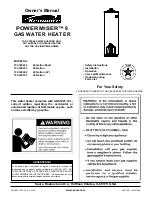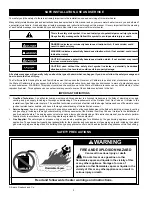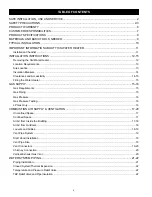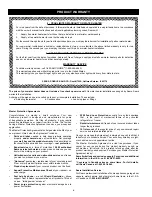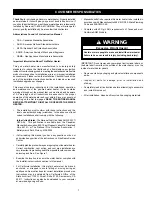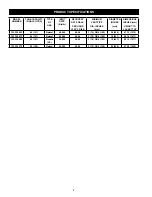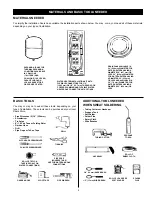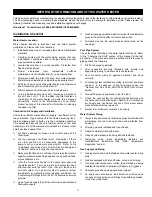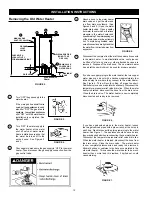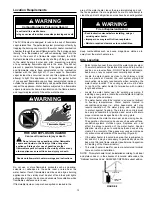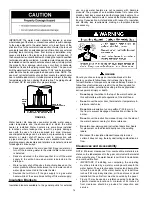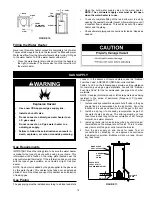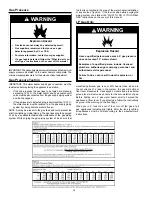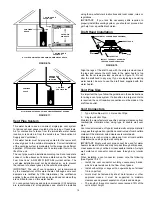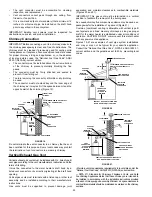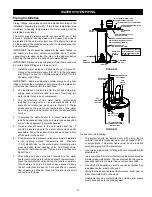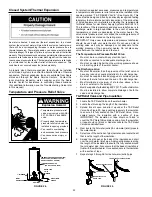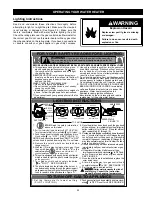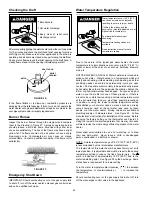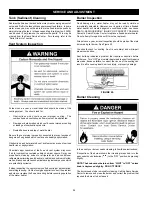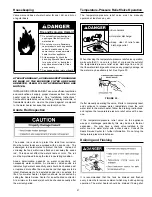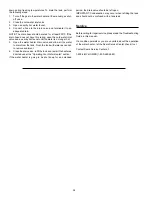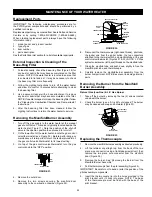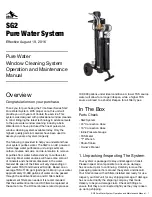
14
IMPORTANT: The water heater should be located in an area
where leakage of the tank or connections will not result in damage
to the area adjacent to the water heater or to lower floors of the
structure. Due to the normal corrosive action of water, the tank will
eventually leak after an extended period of time. Also any external
plumbing leak, including those from improper installation, may
cause early failure of the tank due to corrosion if not repaired. If
the homeowner is uncomfortable with making the repair a qualified
technician should be contacted. A suitable metal drain pan should
be installed under the water heater as shown below, to help protect
the property from damage which may occur from condensate
formation or leaks in the piping connections or tank. The pan must
limit the water level to a maximum depth of 1-3/4” and be two inches
wider than the heater and piped to an adequate drain. NOTE: The
pan must not restrict combustion air flow. Locate the water heater
near a suitable indoor drain. Outside drains are subject to freezing
temperatures which can obstruct the drain line. The piping should
be at least 3/4” ID and pitched for proper drainage.
METAL
DRAIN
PAN
AT LEAST 2” GREATER THAN THE
DIAMETER OF THE WATER HEATER.
PIPED TO AN
ADEQUATE DRAIN
FIGURE 9.
Water heater life depends upon water quality, water usage,
water temperature and the environment in which the water
heater is installed. Water heaters are sometimes installed
in locations where leakage may result in property damage,
even with the use of a drain pan piped to a drain. However,
unanticipated damage can be reduced or prevented by a leak
detector or water shut-off device used in conjunction with
a piped drain pan. These devices are available from some
plumbing supply wholesalers and retailers, and detect and react
to leakage in various ways:
• Sensors mounted in the drain pan that trigger an alarm or
turn off the incoming water to the water heater when water
is detected.
• Sensors mounted in the drain pan that turn off the water
supply to the entire home when water is detected in the
drain pan.
• Water supply shut-off devices that activate based on the
water pressure differential between the cold water and hot
water pipes connected to the water heater.
• Devices that will turn off the gas supply to a gas water
heater while at the same time shutting off its water supply.
Insulation Blankets
Insulation blankets available to the general public for external
use on gas water heaters are not necessary with Kenmore
products. The purpose of an insulation blanket is to reduce the
standby heat loss encountered with storage tank heaters. Your
Kenmore water heater meets or exceeds the National Appliance
Energy Conservation Act standards with respect to insulation
and standby loss requirements, making an insulation blanket
unnecessary.
WARNING
Should you choose to apply an insulation blanket to this
heater, you should follow these instructions (See Figure 1
for identification of components mentioned below). Failure to
follow these instructions can restrict the air flow required for
proper combustion, potentially resulting in fire, asphyxiation,
serious personal injury or death.
•
Do not
apply insulation to the top of the water heater, as
this will interfere with safe operation of the draft hood.
•
Do not
cover the outer door, thermostat or temperature &
pressure relief valve.
•
Do not
allow insulation to come within 2” (50.8 mm) of
the floor to prevent blockage of combustion air flow to the
burner.
•
Do not
cover the instruction manual. Keep it on the side of
the water heater or nearby for future reference.
•
Do
obtain new warning and instruction labels from Sears
for placement on the blanket directly over the existing
labels.
•
Do
inspect the insulation blanket frequently to make
certain it does not sag, thereby obstructing combustion air
flow.
Clearances and Accessibility
NOTE: Minimum clearances from combustible materials are
stated on the label adjacent to the gas control valve/thermostat
of the water heater. The water heater is certified for installation
on a combustible floor.
•
IMPORTANT: If installing over carpeting, the carpeting
must be protected by a metal or wood panel beneath the
water heater. The protective panel must extend beyond the
full width and depth of the water heater by at least three
inches (76.2mm) in any direction; or if in an alcove or closet
installation, the entire floor must be covered by the panel.
•
Figure 10 may be used as a reference guide to locate the
specific clearance locations. A minimum of 24 inches of
front clearance should be provided for inspection and
service.

